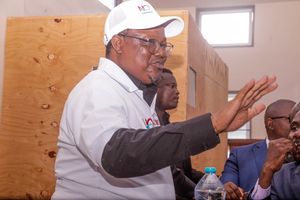Researchers call for inclusion in clean cooking energy drive

What you need to know:
- In a quick rejoinder, however, the government said all the concerns about inclusion will be addressed in a new energy strategy to be launched in June this year
Dar es Salaam. Researchers have revealed a dire need for the government to include everyone, regardless of their economic status, in its plan to transition to the use of clean fuel for cooking.
In a quick rejoinder, however, the government said all the concerns about inclusion will be addressed in a new energy strategy to be launched in June this year.
Speaking yesterday while explaining part of the results of their research at the University of Dar es Salaam (UDSM), experts noted that there have been many challenges in the adoption of clean cooking energy by many households, the biggest being affordability. The research is entitled Clean Cooking and Climate Change (4CImpact).
According to researchers, 25 percent of the households visited in the Kinondoni district in Dar es Salaam Region struggled to get any cooking energy, whether it was charcoal, wood, or liquefied petroleum gas (LPG). Researchers said this shows that unless the issue of affordability is addressed, the transition towards clean energy will leave some people behind.
Dr Kirsten Ulsirud, senior research fellow at the Centre for International Climate Change Research (CICERO), says that there is a need to provide subsidies to all those who will not be able to afford clean cooking fuel so that the whole country can move together.
Another researcher, Dr Borgar Aamaas from CICERO, said lack of access to clean cooking technology is the single largest environmental risk factor for disease and disability in countries relying on traditional biomass fuels for household energy.
“Tanzania’s energy sector is rapidly changing, and an energy transition towards increased usage of non-biomass-based fuels is gaining pace,” he said.
In response, the government hinted that the strategy to review all policies and other laws with the aim of coming up with a 10-year strategic plan for the use of clean energy in cooking has been completed and is expected to be launched in June of this year.
“We have prepared a ten-year strategy for the implementation of the use of clean cooking energy and a vision that will show what needs to be done so that Tanzanians can benefit from the use of this energy,” said Ms Joyce Msangi, Clean Cooking Programme National Coordinator in the Ministry of Energy.
In November 2022, President Samia Suluhu Hassan directed the Ministry of Energy to create a task force to review and process existing policies to move towards the national plan to eliminate the use of dirty cooking fuel by 2032. President Hassan ordered the structure of the task force to include experts from public institutions, the private sector and environmental stakeholders.
She said that the task force should go through various policies and guidelines to come up with a strategic plan and a ten-year vision directing the important things to be done so that by 2032 everyone can use clean energy for cooking.
“We expect this document to be launched by June this year,” said Ms Msangi.
“Studies like this will help us a lot in the preparation of this document,” she said.
Researchers noted that a deep understanding of the household perspective was crucial for the success of higher-level efforts to promote clean energy.



